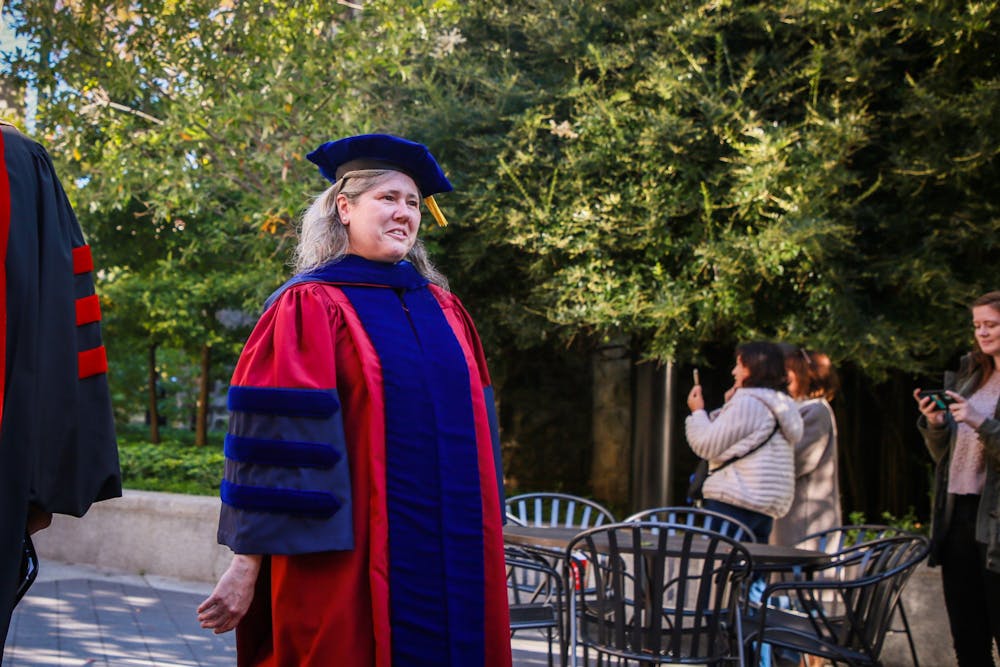
Penn administrators said that the University is on track to appoint a new provost in the spring of 2023.
The Consultative Committee for the Selection of a Provost is currently working on a timeline that will allow Penn President Liz Magill to announce a new provost in the spring, Penn Medicine Dean and chair of the committee Larry Jameson wrote in an email to The Daily Pennsylvanian. Members of the 7B minority coalition and activist groups told The DP that they want to see greater transparency in the new provost’s administration, as well as more openness to student demands.
The provost is the head of academic life at Penn, as well as research and student life, according to the online job listing for the position. The new provost will oversee Penn’s 12 schools, the deans of each school, all faculty, as well as the Vice Provost for University Life, among other departments. Beth Winkelstein has acted as Interim Provost since July 2021, when former Provost and Interim President Wendell Pritchett took a medical leave of absence from the University.
Members of the 7B groups have been able to provide input on the process through Undergraduate Assembly Steering meetings and sessions for general student feedback, according to College senior and Asian Pacific Student Coalition Chair Jeffrey Yu. However, he is unsure how much these members' insights will be taken into consideration in the final selection.
Associate Provost for Communications Leo Charney directed the DP to Jameson for comment.
Both Yu and College senior and Latinx Coalition External Chair Camila Irabien said they hope the new provost will focus on transparency with students.
“Penn historically has a reputation of not really responding to student demands or responding to incidents that happen on campus,” Yu said. “They keep things secret, and we really want to change that culture.”
College and Engineering senior and Fossil Free Penn coordinator Emma Glasser said they hope the next provost will lead an office that is more open to hearing students’ demands.
“University leadership should be actively caring for students, faculty, staff and our community that Penn sits in,” Glasser said. “The administration has been intimidating and suppressing our group's voices and message. We really want a provost who doesn't follow this."
FFP recently ended its encampment on College Green on Oct. 22. The group demanded the Penn commit to preserving the UC Townhomes, divest the endowment from fossil fuels, and make payments in lieu of taxes, or PILOTs, to Philadelphia public schools. During the encampment, which lasted 39 days, FFP members received communications from top Penn administrators, including Winkelstein, asking them to leave College Green in exchange for a meeting.
Students have faced disciplinary consequences and arrests for previous protests, including the disruption of the homecoming football game.
Yu said that although ASPC and the other 7B groups most directly work with Interim Vice Provost Tamara Greenfield King and Associate Vice Provost for Student Life William Atkins, he hopes the new provost will take action when King and Atkins bring up student concerns to them.
Following several decades of activism by the 7B groups, the University reopened the Arts, Research, and Culture House as a home to the 7B and cultural resource centers in September. Renovations of the center will continue through the spring.
Yu said that while the new provost will work with the 7B groups to implement the ongoing ARCH renovations and expansion of the cultural resource centers, the process is mostly insulated from changes in leadership.
“There was already a promise there, and we're looking to hold the University accountable to those promises and move forward with that,” Yu said.
Yu said ASPC and the 7B will continue to push for the provost to fully fund and staff the cultural resource centers. The director of the Pan-Asian American Community House, Peter Van Do, left Penn in September, and has not yet been replaced.
Irabian added that working with administrators on an interim basis in the meantime has changed how the Latinx Coalition approaches meeting and negotiating with administration.
“You sometimes have to be aware, like, maybe you shouldn't spend as many resources trying to get them to change their minds or do things for you because in the end, you're going to have to be talking to another person anyway,” Irabien said.
The Daily Pennsylvanian is an independent, student-run newspaper. Please consider making a donation to support the coverage that shapes the University. Your generosity ensures a future of strong journalism at Penn.
Donate







